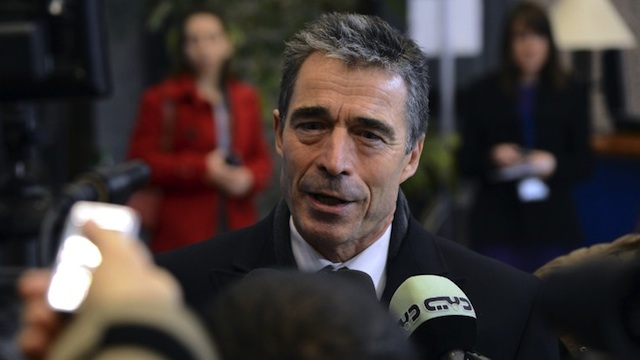SUMMARY
This is AI generated summarization, which may have errors. For context, always refer to the full article.

BRUSSELS, Belgium – NATO said Monday, November 19, it would urgently consider a request from Ankara to deploy Patriot missiles along Turkey’s troubled border with Syria as the EU announced its recognition of the new Syrian opposition coalition.
NATO chief Anders Fogh Rasmussen said the 28-member alliance, which includes Turkey, had received no formal request from Ankara for the surface-to-air missiles, but that if one was made “we will consider that as a matter of urgency”.
German Defense Minister Thomas de Maiziere earlier anticipated an imminent request from Turkey, whose border villages have been hit by artillery fire as forces loyal to Damascus battle rebels seeking to oust Syrian President Bashar al-Assad.
In a new blow to Assad’s regime, the 27-nation EU also formally recognized the opposition National Coalition as a legitimate representative of the Syrian people.
France, which last week became the first Western country to recognize the Coalition as sole representative of the Syrian people, had urged fellow EU nations to follow in its footsteps.
The EU’s statement was a step short of the French stance.
Earlier Monday, Italy joined France in recognizing the National Coalition, becoming the second Western country to do so since the opposition formed the group at talks in Qatar on November 11 after 20 months of conflict that activists say has killed more than 39,000 people.
The United States meanwhile said it was closely monitoring the National Coalition’s progress and weighing whether to recognize the body as the sole representative of the Syrian people.
“We’re obviously looking at this day by day, week by week. We’re getting to know them better. We’re encouraging them to make more progress,” said State Department spokeswoman Victoria Nuland.
“But we will see how things go over the coming weeks,” she added, reiterating Washington’s stance that the bloc is “a legitimate representative of the people”.
Syria headed the agenda as EU foreign and defense ministers flew into Brussels for a day of talks that also touched on the conflict between Israel and Gaza.
But as clashes raged across Syria, the main Islamist groups in the northern city and province of Aleppo, a key frontline in the civil war, including Al-Nusra Front, said they rejected the newly formed opposition bloc, the National Coalition, calling it a “conspiratorial project”.
“We, the fighting squads of Aleppo city and province… announce our consensus to establish an Islamic state” in Syria, a spokesman said in an Internet video posted Monday.
“We reject any external coalitions or councils imposed on us at home from any party whatsoever,” said the unidentified speaker, who sat at the head of a long conference table with at least 30 other men and a black Islamist flag behind him.
But Abdel Jabbar al-Okaidi, the head of the main rebel Free Syrian Army (FSA) in embattled Aleppo, told AFP that the statement did not have unanimous backing in Aleppo.
“These groups represent a number of military factions on the ground and reflect their position, but not all military forces in Aleppo agree with this,” the defected former army colonel told AFP by phone.
“The military council has announced its support for the National Coalition and is collaborating with them,” Okaidi added.
The National Coalition aims to present a united front to the international community and is lobbying for weapons to help topple the Assad regime.
Germany and The Netherlands are the two main European nations that possess Patriots, the medium-range ground-to-air missiles made by US group Raytheon. NATO deployed the missiles in Turkey during the 1991 Gulf war and in 2003 during the Iraqi conflict.
“The situation on the Syria-Turkey border is of great concern,” Rasmussen said. “We have all the plans ready to defend and protect Turkey if needed. The plans will be adjusted if necessary to ensure effective protection of Turkey.”
Rasmussen said there was currently no question of imposing a no-fly zone with the back-up of the Patriot missiles.
On the ground in Syria, fighting flared along the Turkish border on Monday as rebels took full control of a large army base in the province of Aleppo that had been besieged for weeks, a military source and a watchdog group said.
French Foreign Minister Laurent Fabius last week made a controversial proposal to arm the rebels after lifting an EU embargo on delivering arms to Syria.
But EU diplomats noted that lifting the bloc’s current embargo, agreed last year, would require unanimity, while delivering arms to one side would be a highly complex matter.
Rejecting the idea out of hand, Sweden’s Foreign Minister Carl Bildt said his country “does not arm people who are fighting”. – Claire Rosemberg, Agence France-Presse
Add a comment
How does this make you feel?
There are no comments yet. Add your comment to start the conversation.